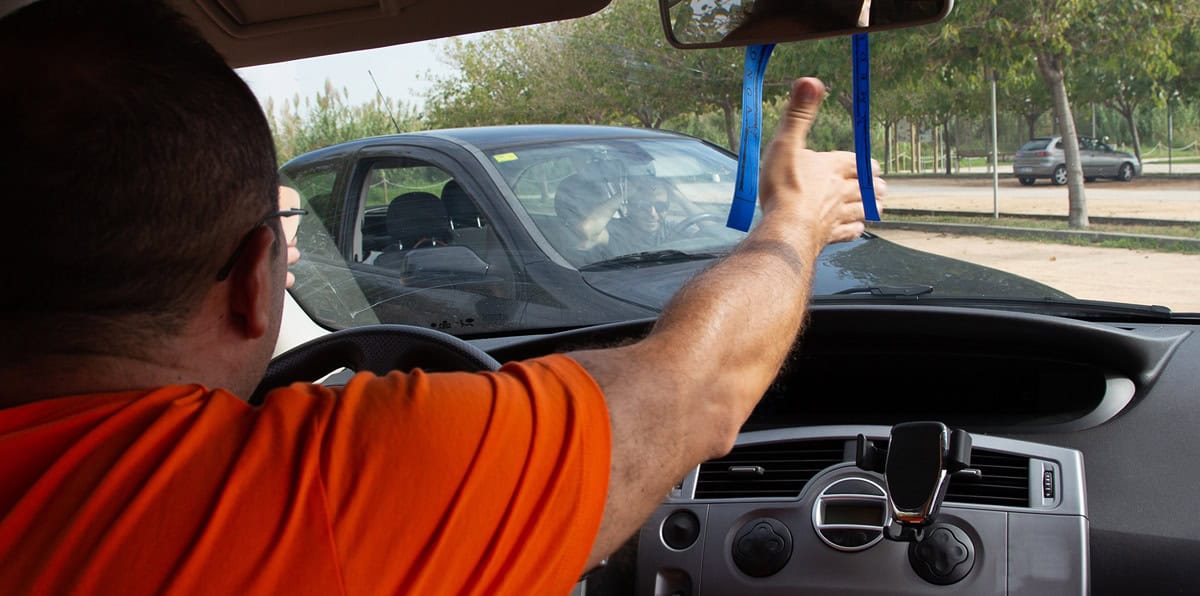In the heat of a road rage encounter, emotions escalate fast—and so can the legal consequences. What may start as a shouting match can quickly evolve into physical violence or threats involving a vehicle. If you reacted to defend yourself, it might come as a shock to find yourself arrested.
But under Arizona law, even acts of self-defense can lead to assault or aggravated assault charges if law enforcement or prosecutors believe your actions went too far.
This article breaks down your legal rights during a road rage incident, including how Arizona’s self-defense and “Stand Your Ground” laws apply. We’ll also explain when a vehicle might be considered a deadly weapon and how that can turn a misdemeanor into a felony. If you’ve been charged or are under investigation after a road rage altercation, this information could be vital.
This article will cover the following subtopics:
- Understanding Arizona Assault and Aggravated Assault Laws
- When Is Self-Defense Legal During a Road Rage Incident?
- Arizona’s Stand Your Ground Law and How It Applies
- Using a Vehicle as a Deadly Weapon in an Assault Case
- Real-World Examples of Road Rage Arrests and Legal Misunderstandings
- Penalties for Assault and Aggravated Assault in Arizona
- Common Defenses in Road Rage Assault Cases
- FAQs About Self-Defense and Road Rage Incidents
- How Shah Law Firm Can Help Defend Your Rights
Attorney Arja Shah and the Shah Law Firm have represented hundreds of clients facing assault allegations stemming from self-defense situations. With nearly two decades of criminal defense experience across Maricopa County, including Phoenix, Tempe, Scottsdale, Mesa, and Glendale, Attorney Shah knows how to challenge the narrative before it becomes a conviction.

Understanding Arizona Assault and Aggravated Assault Laws
Arizona law defines assault under ARS 13-1203 as any action where a person:
- Intentionally, knowingly, or recklessly causes physical injury to another person,
- Intentionally places another person in reasonable apprehension of imminent physical injury, or
- Knowingly touches another person with the intent to injure, insult, or provoke them.
Depending on the severity of the alleged conduct, assault can be charged as a class 1, 2, or 3 misdemeanor.
If the situation involves serious injury, the use of a deadly weapon (such as a firearm—or in many road rage cases, a vehicle), or assaulting someone in a protected class (like a police officer), the charge escalates to aggravated assault under ARS 13-1204.
Aggravated assault is classified as a felony and can carry prison time, even if the person charged was acting out of fear or instinct during a chaotic encounter.
When Is Self-Defense Legal During a Road Rage Incident?
Arizona law recognizes your right to protect yourself from harm. ARS 13-404 states that a person is justified in using physical force if they reasonably believe it is necessary to protect themselves against another’s use or attempted use of unlawful force.
However, the law also places limits on what is considered “reasonable.” Self-defense is not permitted if you:
- Provoked the initial confrontation,
- Used more force than necessary, or
- Continued using force after the threat had passed.
In a road rage scenario, determining what is reasonable can be tricky. If someone exits their vehicle and charges at you aggressively, throwing punches or threatening you with a weapon, you may have the right to defend yourself. But if the other person retreats and you then chase or escalate the situation, that may cross the line from self-defense into assault.
Arizona’s Stand Your Ground Law and How It Applies
Arizona follows a version of the “Stand Your Ground” principle. While not explicitly called that in the statutes, ARS 13-404 and case law establish that individuals do not have a duty to retreat before using physical force if they are in a place they are lawfully allowed to be, such as a public roadway or their own vehicle.
Key points under Arizona’s version of “Stand Your Ground”:
- You must not be the aggressor.
- You must reasonably believe that force is immediately necessary.
- You do not have to retreat before acting in self-defense.
In road rage cases, this means if someone threatens you at an intersection or follows you to a parking lot and corners you, you are not required to drive away if that is not reasonably safe. You can defend yourself, but your actions must still be proportionate to the threat.
Using a Vehicle as a Deadly Weapon in an Assault Case
One critical issue in road rage altercations is the use—or perceived use—of a vehicle as a weapon.
Under ARS 13-1204(A)(2), using a “deadly weapon or dangerous instrument” elevates a regular assault to aggravated assault. Arizona courts have repeatedly held that a vehicle can qualify as a deadly weapon or dangerous instrument depending on how it’s used.
Examples include:
- Intentionally swerving toward another person on foot or in a vehicle,
- “Brake-checking” another car aggressively to provoke a collision,
- Attempting to run someone off the road.
Even if there’s no collision or injury, the act of using a vehicle in a threatening manner can lead to felony charges. And because aggravated assault with a deadly weapon is a dangerous offense under Arizona law, it carries mandatory prison time upon conviction.
Real-World Examples of Road Rage Arrests and Legal Misunderstandings
Example 1:
A man in Mesa honks at another driver who cut him off. That driver exits his car at a stoplight and punches the man through his open window. The man then pulls out pepper spray and uses it defensively. Police are called, but the aggressor blames the other man for escalating the incident. Despite acting in self-defense, the man with the pepper spray is arrested for assault and must fight the charge in court.
Example 2:
A woman in Tempe tries to avoid a confrontation with another driver who is tailgating and yelling. When she pulls into a parking lot, the other driver follows her and approaches on foot. Fearing for her safety, she slowly drives forward to block the other person’s path, but the person claims she tried to hit him. She is later charged with aggravated assault with a dangerous instrument (her car).
These situations highlight how quickly the law can turn against someone who believed they were simply protecting themselves.
Penalties for Assault and Aggravated Assault in Arizona
The penalties for assault-related charges depend on the level of harm, the presence of a weapon (including vehicles), and any prior criminal history.
Here’s a summary of potential consequences:
| Charge | Classification | Penalty Range | Relevant Statute |
| Simple Assault (No injury) | Class 3 Misdemeanor | Up to 30 days in jail | ARS 13-1203 |
| Assault Causing Injury | Class 1 Misdemeanor | Up to 6 months in jail | ARS 13-1203 |
| Aggravated Assault With Deadly Weapon (Vehicle) | Class 3 Dangerous Felony | 5–15 years in prison (first offense) | ARS 13-1204(A)(2), ARS 13-704 |
Even a first-time offense can result in years in prison if a vehicle is deemed a weapon in the incident. Having an experienced defense attorney is critical to reduce or dismiss these charges.
Common Defenses in Road Rage Assault Cases
Attorney Arja Shah has successfully defended clients by asserting legal and factual defenses, including:
- Self-Defense or Defense of Others: You acted to prevent harm to yourself or someone else, as allowed under ARS 13-404 and ARS 13-406.
- Lack of Intent: You didn’t intentionally or knowingly cause fear or injury.
- Mutual Combat: Both parties contributed to the confrontation.
- False Accusation or Misleading Statement: The other person may be exaggerating or fabricating the incident.
- No Use of a Dangerous Instrument: Your vehicle was not used as a weapon, and the aggravated assault charge is overblown.
Having a knowledgeable defense attorney like Arja Shah can make a significant difference in how prosecutors view these events. Early intervention can even prevent charges from being filed.
FAQs About Self-Defense and Road Rage Incidents
⑴ Can I use pepper spray or a weapon in a road rage situation?
Yes, if you are in reasonable fear of imminent harm. However, excessive or retaliatory use may lead to charges.
⑵ Is yelling or cursing considered assault?
No, unless it includes a direct threat of harm or leads the other person to fear for their safety.
⑶ Can I be charged even if the other person started the fight?
Yes, especially if law enforcement believes you escalated the situation or used excessive force.
⑷ Is it better to drive away rather than defend myself?
If safe to do so, yes. But Arizona law does not require you to retreat under Stand Your Ground principles.
⑸ Will my dashcam footage help?
Possibly. It can provide evidence of who was the aggressor and whether your response was proportionate.
How Shah Law Firm Can Help Defend Your Rights
 If you’ve been arrested after defending yourself during a road rage incident, you don’t have to face the justice system alone. Attorney Arja Shah understands how quickly these situations spiral and how the legal system sometimes punishes those who try to protect themselves.
If you’ve been arrested after defending yourself during a road rage incident, you don’t have to face the justice system alone. Attorney Arja Shah understands how quickly these situations spiral and how the legal system sometimes punishes those who try to protect themselves.
With nearly 20 years of criminal defense experience and over 3,000 case victories, Arja has built strong relationships with prosecutors and law enforcement throughout Maricopa County. She knows how to challenge the use of biased testimony, question the interpretation of dashcam or surveillance footage, and highlight inconsistencies in witness statements.
Shah Law Firm offers free consultations where you speak directly with Arja Shah—not a case manager. This one-on-one attention ensures your side of the story is heard from the beginning.
Call (602) 560-7408 or visit https://arjashahlaw.com to schedule your free consultation today.
Important Things to Remember
- You can still be arrested even if you believe you acted in self-defense.
- Arizona law does not require you to retreat from an aggressor.
- Using your vehicle aggressively can lead to felony charges.
- Police often rely on limited witness accounts or one-sided narratives.
- Early legal representation can help prevent a charge from becoming a conviction.







